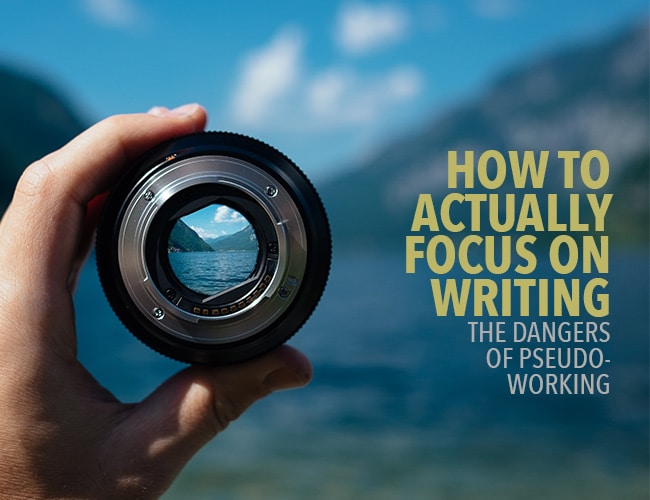I first heard the term “pseudo-working” from Cal Newport, author of How to Become a Straight A Student and Deep Work. Pseudo-working looks like work, but it doesn’t produce much. If you’ve ever been trying to focus on writing an article while checking your phone for social media updates and fielding dinner requests, you’re pseudo-working. (No, I’m not doing that right now, why do you ask?)

3 Dangers of Pseudo-Working
Admitting the dangers of pseudo-working has helped me focus and get more writing done in less time. See if it will help you too!
Danger 1: You think you are working
When I used to juggle multiple tasks at once, I’d tell myself I was multitasking. It was a lie. I was switching from one task to another and forcing my brain to work twice as hard to shift, reorient, engage, and repeat.
Pseudo-working looks like work, but it doesn’t produce much at the end of the day because I’ve expended most of my energy in the act of switching tasks.
Danger 2: You think you have a time problem
You don’t have a time problem if you are pseudo-working. You have a distraction problem. By framing it as a time problem, you’re giving yourself an out.
“But I spent two and a half hours looking for a name for my character!” No, Mavis, you spent a total of twelve minutes searching for a name in between two hours of social media, a phone call to your mum, and fourteen text messages.
Danger 3: You believe your own lie
I had a class last year who asked me to make them a sign for our classroom with my oft quoted phrase, “Don’t believe the lie …” I was specifically referring to procrastination, but it is the same lie we tell ourselves when we pseudo-work. “I’m doing well on this. I just need to check __{insert distraction}__ real quick.”
I don’t need to check anything as much as I need to finish my writing during the time I have scheduled. (Unless of course someone has an emergency, but checking Twitter is not an emergency no matter what my students say.)
I’m speaking to myself here: stop believing the lie. Focus on writing or don’t, but stop getting caught in the pseudo-working cycle.
Break the Cycle and Focus on Writing
Okay, so pseudo-working doesn't work. But how do you break the cycle and actually focus on writing? Here are two strategies I use.
Get Honest
If you’re ready to stop pseudo-working, first, evaluate your work habits. As I evaluated my own habits, I had to get honest about how many times I switched screens or glanced at my phone while I wrote.
If you have a phone that tracks “screen time” it can show you total times you picked it up, the total time on various sites, and all sorts of information that will make you realize how dependent you are on your phone. (Well, maybe that’s just me.)
I had to admit to myself that each time I “checked” something, I lost time and momentum.
Get Single-Minded
If you’ve realized that you pseudo-work often, set a small goal for yourself and get focused. Set aside fifteen to forty-five minutes and focus on writing solely that single project. Put your phone in another room, shut off the wifi and block your access to distracting sites, and write until the time is up or your goal is met.
Track your progress and see what produces the most work. You may find it’s more effective to schedule short focused bursts that eliminate distractions than to plan long extended periods where you’re interrupted often.
Your Writing Is Worth the Focus
It isn’t easy to conquer the temptation to pseudo-work. With practice though, we can overcome distractions and get more writing done in the year ahead!
How often do you pseudo-work? What tricks do you use to focus on writing? Share your experiences or best tips for beating distractions in the comments.
PRACTICE
Right now, focus on writing for fifteen minutes. Set aside your phone. Close all those tabs you have open to your favorite social media. Pull out a pen and paper and shut yourself in your closet if you have to.
If you have a work in progress, continue writing it. Or, try this writing prompt: Jackson hears a crash in the next room.
When your fifteen minutes are up, share your writing practice in the comments below. Were you able to focus on writing? How hard was it to fight distractions?
Be sure to leave feedback for your fellow writers, too!
Sue Weems is a writer, teacher, and traveler with an advanced degree in (mostly fictional) revenge. When she’s not rationalizing her love for parentheses (and dramatic asides), she follows a sailor around the globe with their four children, two dogs, and an impossibly tall stack of books to read. You can read more of her writing tips on her website.



0 Comments